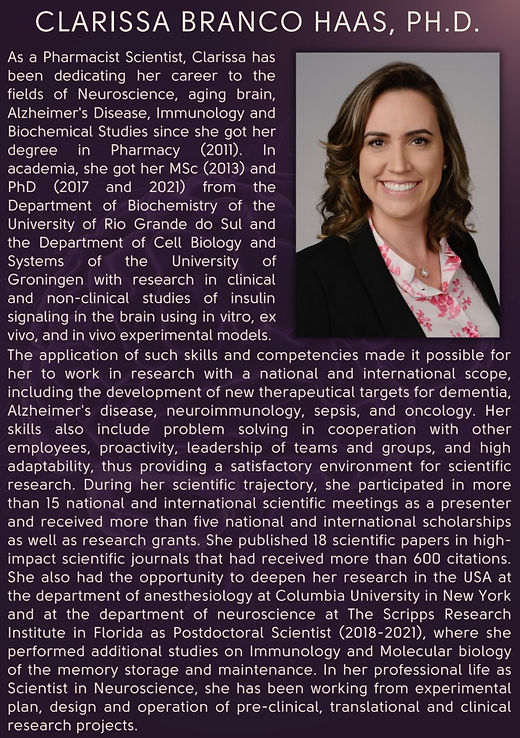
Functional Nanoencapsulated Insulin
with intranasally deliver to boost Alzheimer's treatment

OPPORTUNITY
The goal of the present project is to develop an innovative technology consisting of functional nanoencapsulated insulin that will be delivered intranasally directly to the neurons, improving memory loss and offering a better quality of life for patients and family caregivers. Alzheimer's disease (AD) is a severe brain disorder that slowly destroys memory and affects as many as 6 million Americans, most of them aged 65 or older. Alzheimer's represents a heavy social and economic burden, which is expected to worsen considering the increased life expectancy, making it urgent to find new treatment opportunities for Alzheimer's. Insulin is well known for its role in the body's metabolism and is also known to be essential for memory loss prevention in the brain. During the progression of the disease, neurons (the main cell type in the brain) lose the protective effect of insulin, which is necessary for the development of new drug-delivery technologies for insulin to efficiently target neurons.
NATIONAL IMPORTANCE

The National Alzheimer's Project was extended through 2035 under the NAPA Reauthorization Act (H.R. 7775), which was published by the US government. In order to combat Alzheimer's disease and other related dementias, this project supports the coordination of federal planning, programs, and other initiatives. The bill places a special emphasis on encouraging healthy aging and lowering risk factors for cognitive decline. The bill also broadens the composition of the Advisory Council on Alzheimer's Research, Care, and Services to include representatives from additional federal agencies, an individual with Alzheimer's disease, and a researcher with experience enlisting and retaining a diverse group of clinical trial participants. As we've seen, the NAPA (State Pro Alzheimer's Research Act) takes into account new insights into the illness, and only two other biomedical research fields—cancer and HIV/AIDS—have received specialized funding designed to speed up discovery.

PROJECT SCOPE
According to the Alzheimer's Association, the term "dementia" refers to a specific set of symptoms. Dementia is characterized by problems with memory, language, problem-solving, and other mental abilities that impair a person's ability to carry out daily tasks. There are numerous causes of dementia. The most common cause of dementia is Alzheimer's disease, which is a particular kind of degenerative brain illness that becomes worse over time. Alzheimer's disease is believed to start 20 years or more before symptoms appear, with changes in the brain that the sick person is unaware of. People don't start to notice symptoms like memory loss and language difficulties until years of brain changes have taken place. The origin of symptoms is the destruction or injury of nerve cells called neurons in regions of the brain involved with thinking, learning, and remembering (cognitive function). Other sections of the brain's neurons experience damage or degeneration as the disease worsens. Eventually, the nerve cells that allow a person to walk and swallow are compromised, as are other brain regions that are necessary for fundamental body activities. People end up in bedbound situations and need 24-hour care. Alzheimer's disease has a fatal outcome.
The National Library of Medicine claims that insulin supports memory function and may be a useful therapeutic target in the prevention and management of memory disorders, including Alzheimer's disease. Acute and prolonged intranasal insulin administration improves memory function, according to proof-of-concept studies and clinical trials in people with mild cognitive impairment or Alzheimer's disease. These findings also imply that brain insulin resistance is a pathophysiological factor in Alzheimer's disease with or without concurrent metabolic dysfunction. Insulin given intranasally is thought to increase synaptic plasticity, promote regional glucose absorption, and lessen the neuropathology associated with Alzheimer's disease. Despite the fact that intranasal insulin delivery has been conclusively shown to be safe and effective, the recent results of large-scale clinical studies highlight the need for additional research. These studies may also provide new information about how the sexes respond differently to intranasal insulin and help to improve delivery methods so that intranasal insulin can be used to its fullest extent in the treatment of Alzheimer's disease. Therefore, this program has the potential to significantly enhance the Alzheimer's medical sector. Check out the article attached at the end for more details on insulin's therapeutic effects for Alzheimer's.
STRUCTURE



PROJECT TIMELINE

JOBS CREATION

SWOT ANALYSIS

FOUNDER

